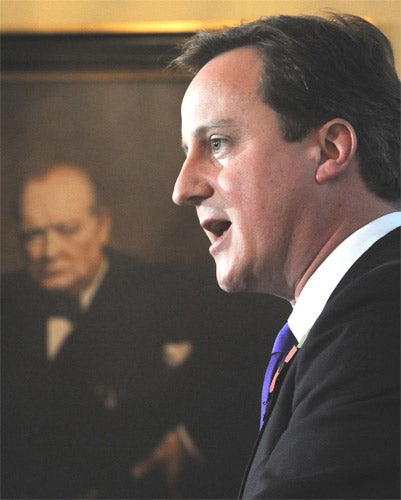Cameron backs down on EU treaty referendum

David Cameron declared yesterday that he would not allow his premiership to be dominated by a "massive bust-up" with the European Union as he shelved any Europe referendum for at least five years.
The Tory leader masked his retreat from his promise of a public vote on the EU's Treaty of Lisbon with a firm pledge that powers would "never again" be transferred from the UK to Brussels without a referendum and that all future European treaties would require one in Britain. But he declared that he would not call a "phoney referendum" now that the Lisbon Treaty to streamline EU decision-making has been approved, saying it would achieve nothing.
He tried to reassure Eurosceptic MPs and grassroots Tories by promising to negotiate a return of some EU powers over workers' rights and criminal justice to the UK and to demand a more secure opt-out from the EU's charter of fundamental rights. He promised a Sovereignty Bill to stop the European Court of Justice overriding the British courts and to ensure that Britain has "the final word" on its own laws.
Mr Cameron also said that a UK referendum could be held following the general election after next if the EU continued down a federalist path. Despite his tough words, his overall message in a speech in London was that he would pursue a more "softly softly" approach to Europe if the Tories win the general election than many of his MPs would want. "Yes, I believe we will be able to negotiate the return of the powers I have set out. But no, we will not rush into some massive Euro bust-up," he said. "We will take our time, negotiate firmly, patiently and respectfully, and aim to achieve the return of the powers I have set out over the lifetime of a parliament."
Admitting that some people wanted him to go further and faster, he said: "If we win the election, we will inherit the worst public finances of any incoming government for 50 years. We will have a generational challenge to get Britain to live within her means, to secure economic recovery and to deliver this country from the appalling mess left by this Labour Government. That has to come before anything else."
An incoming Tory government would amend the 1972 European Communities Act which took Britain into the EU to include an Irish-style "referendum lock" on any treaty handing over further powers to Brussels – including joining the euro. Insisting that his new policy was "credible, doable and deliverable", Mr Cameron denied that he was backtracking on a Lisbon Treaty referendum as his promise had never applied once it became law. "I recognise there are some who, now that we cannot have a referendum on the Lisbon Treaty, want a referendum on something else... anything else," he said. "But I just don't think it's right to concoct some new pretext for a referendum simply to have one for the sake of it."
Mr Cameron received broad support when he outlined his new stance at a meeting of the 1922 Committee of Tory MPs. But some of his MPs expressed their disappointment. Douglas Carswell said: "I think we need a referendum on our relationship with Europe."He criticised Mr Cameron's proposals to ensure British law had primacy over EU law, saying it might merely entrench the status quo.
Tim Montgomerie, editor of the ConservativeHome website, said Mr Cameron gave every impression of wanting to kick Europe into the long grass. "Given that Lisbon is a self-amending Treaty, full of ratchet clauses, the promise of future referenda on transfers of power is a bit like closing the stable door after the horse has bolted. There were no meaningful threats to Europe if there is no serious willingness from other EU leaders to renegotiate." Nigel Farage, leader of the UK Independence Party, which wants Britain to leave the EU, accused Mr Cameron of attempting to deceive the public."The true state of affairs is that we are signed up to a higher, European legal order. Renegotiation is not credible or doable. This is all too little too late," he said.
Join our commenting forum
Join thought-provoking conversations, follow other Independent readers and see their replies
Comments
Bookmark popover
Removed from bookmarks